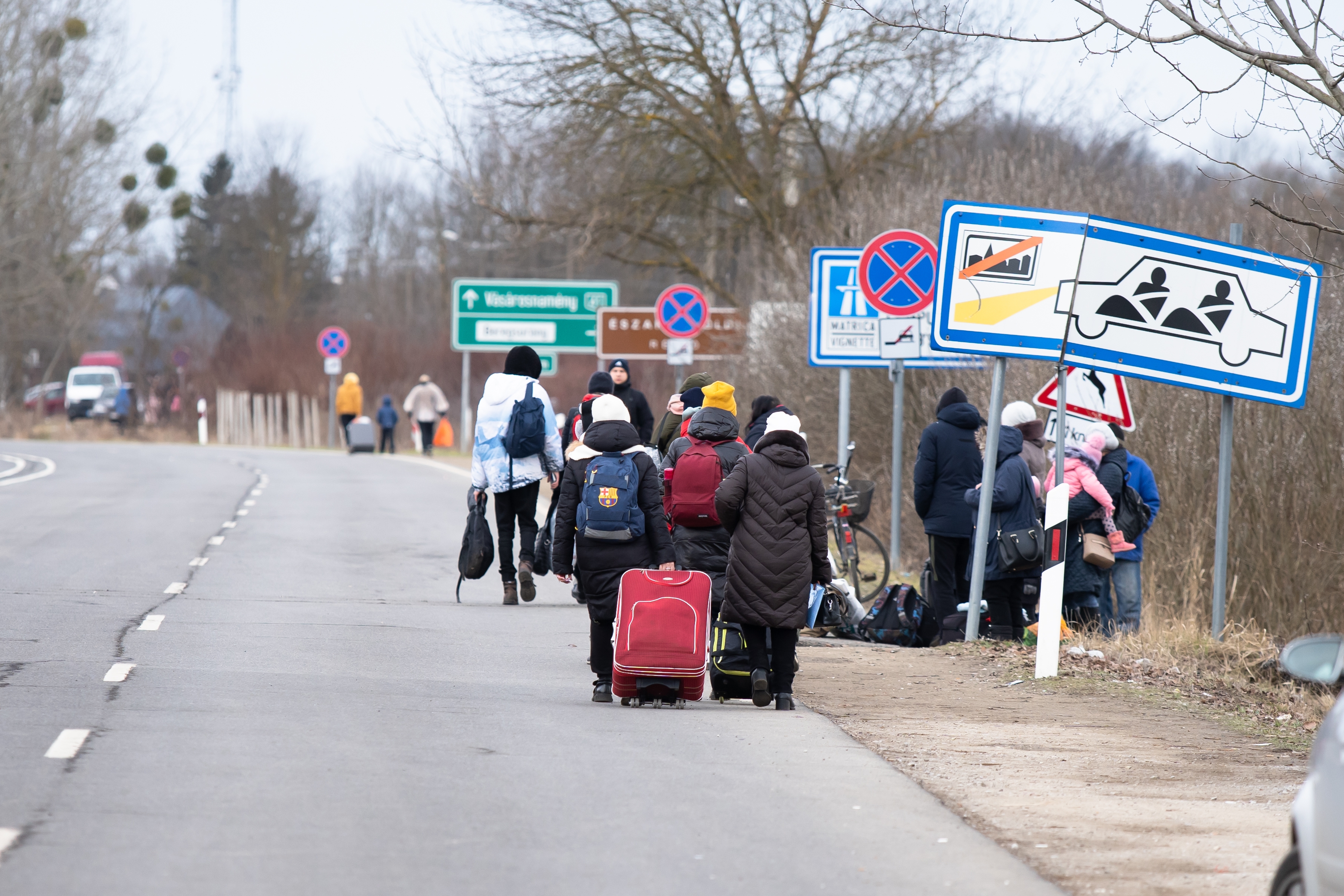Some survivors began to emerge from the rubble of a theater that Russians destroyed Wednesday in the besieged city of Mariupol as Ukrainian resistance to Russia continues across the country. More than 3 million Ukrainians have now fled their country and many more have moved toward safety within it. Jane Ferguson reports from Kyiv with support from the Pulitzer Center.

As a nonprofit journalism organization, we depend on your support to fund coverage of global conflicts. Help us continue funding the hard costs of in-depth coverage of the Ukraine invasion—including travel, hostile environment safety training, and the increased security expenses that arise from reporting in war zones.
Read the Full Transcript
Judy Woodruff: Some survivors began to emerge from the rubble of a theater that Russians destroyed yesterday in the besieged city of Mariupol. They had sought shelter there from relentless Russian attacks.
Ukrainian resistance continues. And more than three million Ukrainians have now fled their country. Many more have left their homes, but are still within Ukraine trying to find safety.
Amid the ongoing carnage, the family of an American citizen who was killed by Russian fire yesterday north of Kyiv. Jim Hill, a Minnesota native, had gone with his partner to a hospital where she'd been receiving medical treatment. He was a second American killed in the war.
We begin our coverage again tonight with Jane Ferguson reporting from Kyiv.
Jane Ferguson: It was meant to be easy and fast. Vladimir Putin thought his army would sweep across this countryside from the Russian border to the east and into the nearby Ukrainian capital, Kyiv.
Instead, against the odds, these soldiers dug in, and fought them to a standstill, soldiers like Arthur, from the 72nd Brigade, northeast of Kyiv.
The Ukrainian military is outgunned. How is it that you are holding them off?
Arthur, Ukrainian Soldier: With all we have. We get the supplies. So we are ready to stop them with all of what Ukraine has produced, with what we have, with what our partners gave us, thankfully. So, now with Javelins and so on, we — it's much easier to stop combat vehicles and tanks.
Jane Ferguson: Those Javelins he mentions are American-made anti-tank missiles. The Javelin and others like it, such as Stinger missiles, MANPADs, and the British NLAW, have become a vital piece of military aid sent to the Ukrainian army.
They have destroyed Russian tanks, jets, and helicopters. On Wednesday, the Biden White House announced it would send even more of them to the Ukrainian army as part of a wider aid package.
Joe Biden, President of the United States: More tools to fight Russian aggression.
Arthur: The only problem is airplanes. So, yesterday, one such rocket landed in this field, and we had nothing to stop it. So we are ready to fight tanks, artillery, soldiers. Whatever they bring here, we can bring it back. But, as for aircraft, it's much harder.
Jane Ferguson: Ukrainian President Volodymyr Zelenskyy has begged NATO to enforce a no-fly zone across their skies. That is unlikely to happen, given the risk of a dangerous escalation between the NATO and Russia.
We traveled to the front line northeast of Kyiv, to where the 72nd Brigade is holding the Russians off.
This village is the last one at the front line controlled by Ukrainians, the next one, contested, the one after that, Russian-controlled. You can see in the distance here the smoke from artillery fire there. So, this is Ukrainian territory, and that is Russian territory. But it's important to remember, this war is about a lot more than that. This is where democracy ends, and over there is where autocracy starts.
Arthur: We are not fighting, just, like, random occupants. We are defending our independence, our ideas, our will for freedom, our difference as for Russians, because we want to be independent. We want to be with the Western world.
Jane Ferguson: How long do you think you can hold out here?
Arthur: I think we have no chance. We have nothing but to win. So, we will fight until the end. It's our land. It's our villages. It's our people. We can't leave it just to the enemy.
Jane Ferguson: So, morale is pretty high here?
Arthur: Yes, surely. We have even — we don't even have a thought that we can lose or whatever. We will win. It's like 100 percent. It depends on how soon it will be, because how soon means how much peaceful lives we will lose.
Jane Ferguson: Peaceful life has already been shattered. In a nearby house, an unexploded rocket lays in this front yard, just a few feet from a civilian home.
All along the road from Kyiv, we saw local people still here, but perilously close to the fighting. One family managed to somehow escape a nearby village controlled by Russians, some of them badly injured, all shaken.
Svetlana, Displaced Resident (through translator): There are no humanitarian corridors. Nobody can leave. There are lots of children and elderly people. Some of them are sick. But no one can leave.
Jane Ferguson: Across this country, civilians are targeted and trapped. For the fourth straight day, an apartment complex in the capital came under attack, today hit by the fragments of a Russian missile shot down by Ukrainian air defense, killing this man's mother.
The survivors rush to escape. All they can take with them is whatever they can carry.
Sergiy Ustenko, Kyiv Resident (through translator): This is a war. Russia attacked us, and we don't know what for.
Jane Ferguson: Ukraine said Russia held fire long enough today for nine humanitarian corridors to evacuate civilians from areas under attack across the country, including from Mariupol.
Women and children had been sheltering in the basement of this theater from Russian attacks. Yesterday, Russian bombs destroyed it. Authorities said today many were killed. Rescuers still searching for people under the rubble. For those still stuck inside the city, many are without gas, water, and any way to communicate with loved ones outside.
Elena, Mariupol Resident (through translator): We are trying to survive somehow. It's just that I can't tell my mother that I'm alive. There is no connection, just nothing. It is cruel. My child is hungry. I don't know what to give him to eat.
Jane Ferguson: For the first time this week, some residents were able to leave using private convoys. This one arrived yesterday near the separatist-held city of Donetsk.
U.S. military officials say Russian advances on all fronts remain largely stalled. But Russian soldiers control areas in dark pink and encircle five cities. To stop their advance, Zelenskyy once again called for help. In a speech to the German Parliament, he took aim at Berlin for reluctance to sever economic ties with Russia, borrowing from a famous Ronald Reagan speech given in 1987 just steps from that Parliament.
Volodymyr Zelenskyy, Ukrainian President (through translator): You are again behind the wall. It is not the Berlin one, but in the middle of Europe, between freedom and captivity.
A former actor and U.S. president, Ronald Reagan, once said in Berlin, "Mr. Gorbachev, tear down this wall."
And I say the same thing to you, dear Chancellor Scholz. Destroy this wall.
Jane Ferguson: For the "PBS NewsHour," I'm Jane Ferguson in Kyiv, Ukraine.
Judy Woodruff: And, Jane, thank you very much for your reporting.







